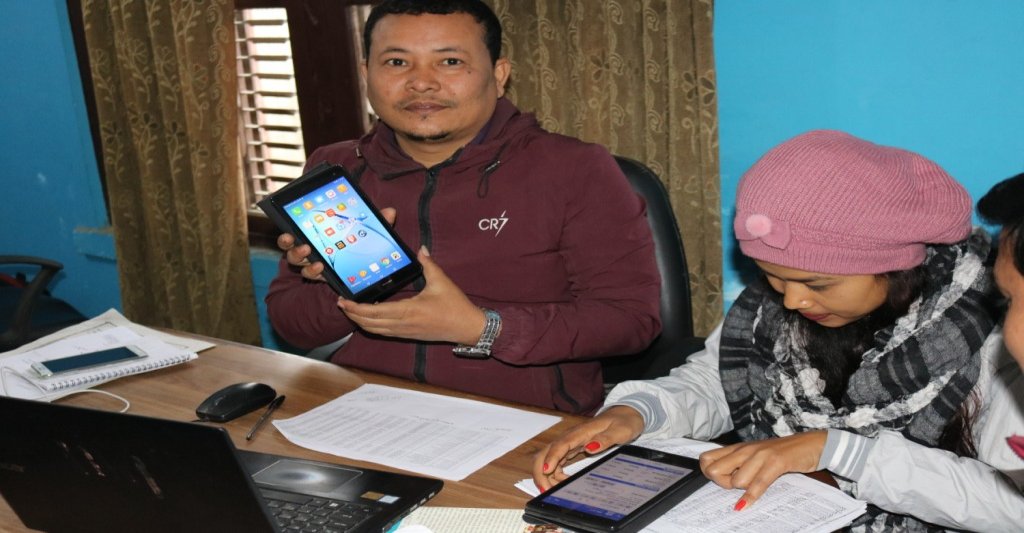About FORWARD Microfinance Laghubitta Bittiya Sanstha Ltd.
FORWARD Microfinance Laghubitta Bittiya Sanstha (Pa. Ltd.), “the microfinance for upliftment of the poor” is a microfinance institution established in September 2012 under Company Act of Nepal 2006. Nepal Rastra Bank, the Central Bank of Nepal, granted a license in March 2013 to undertake financing activities under the Bank and Financial Institution Act 2006. It started its formal operation from May 2013. FORWARD Community Microfinance Bittiya Sanstha Limited (FORWARD) provides microfinance services such as Loans, Deposits, Micro-insurance and Remittance services to low income families of Nepal. FORWARD follows group lending based on Grameen Bank, Bangladesh model microfinance as well as non-group lending based on its own model through a network of all branch offices in Nepal.
Though, legally established as a company in 2012, the operation of FORWARD is a continuation of microfinance services provided by an NGO called “FORWARD” which was providing microfinance services since January 2003. The story behind the establishment of “FORWARD” starts from 2002 when Ms. Bhagbati Chaudhary, then senior officer visited Grameen Bank in Bangladesh. This visit inspired them to launch microfinance program in Nepal through “FORWARD” . Than FORWARD began its microfinance operations in March 2003.
FORWARD, as an NGO had a limited recourses and capacity to satisfy unmet demand of poor people in different part of the country. This resulted the establishment of FORWARD Microfinance as a Company where FORWARD - NGO became a lead promoter of the financial Institution. In October 2013, FORWARD NGO transferred all microfinance program including its staffs, assets and liabilities to FORWAD Microfinance.
Strategic reasons for promoting FORWARD Microfinance are:
- Financial Institutions are supervised and regulated by the Central Bank, which will enforce banking standards;
- A Financial institution can have access to different sources of funding enabling it to satisfy financial need of low income households;
- The Financial Institution can lend to a wider range of clients, including group graduates interested to receive individual loans. Further, a Financial Institution can accept collateral for potentially larger and diverse loan products.
- The Financial Institution can provide continuous financial services in ongoing concern but NGO is yearly renewal from district administration office, so community can take more trustful from Financial Institution then NGO.
Compliance and Grievance Handling Officer
Head Office
M/s Hira Kumari Thandar, Chief Manager
email: This email address is being protected from spambots. You need JavaScript enabled to view it.
Mobile No.: 9802788572
Koshi Province
Mr. Ramanand Mehta
email: This email address is being protected from spambots. You need JavaScript enabled to view it.
Mobile No.: 9802707963
Madhesh Province
Mr. Sharan Kumar Chaudhary
email: This email address is being protected from spambots. You need JavaScript enabled to view it.
Mobile No.: 9802768091
Bagmati/Gandaki Province
Mr. Lekhanath Subedi, Province Chief
email: This email address is being protected from spambots. You need JavaScript enabled to view it.
Mobile No.: 9802788629
Lumbini/Karnali Province
Mr. Raj Narayan Chaudhary, Province Chief
email: This email address is being protected from spambots. You need JavaScript enabled to view it.
Mobile No.: 9802788635
Sudurpashchim Province
Mr. Ram Lal Uranw, Province Chief
email: This email address is being protected from spambots. You need JavaScript enabled to view it.
Mobile No.: 9802788631
नेपाल राष्ट्र बैंक गुनासो दर्ता लिंक
Mr. Krishna Prashad Bhattarai
Company Secretary
email: This email address is being protected from spambots. You need JavaScript enabled to view it.
Mobile No.: 9802788599
Mr. Pradeep Kumar Chaudhary
Compliance Officer
email: This email address is being protected from spambots. You need JavaScript enabled to view it.
Mobile No.: 9802788583


















